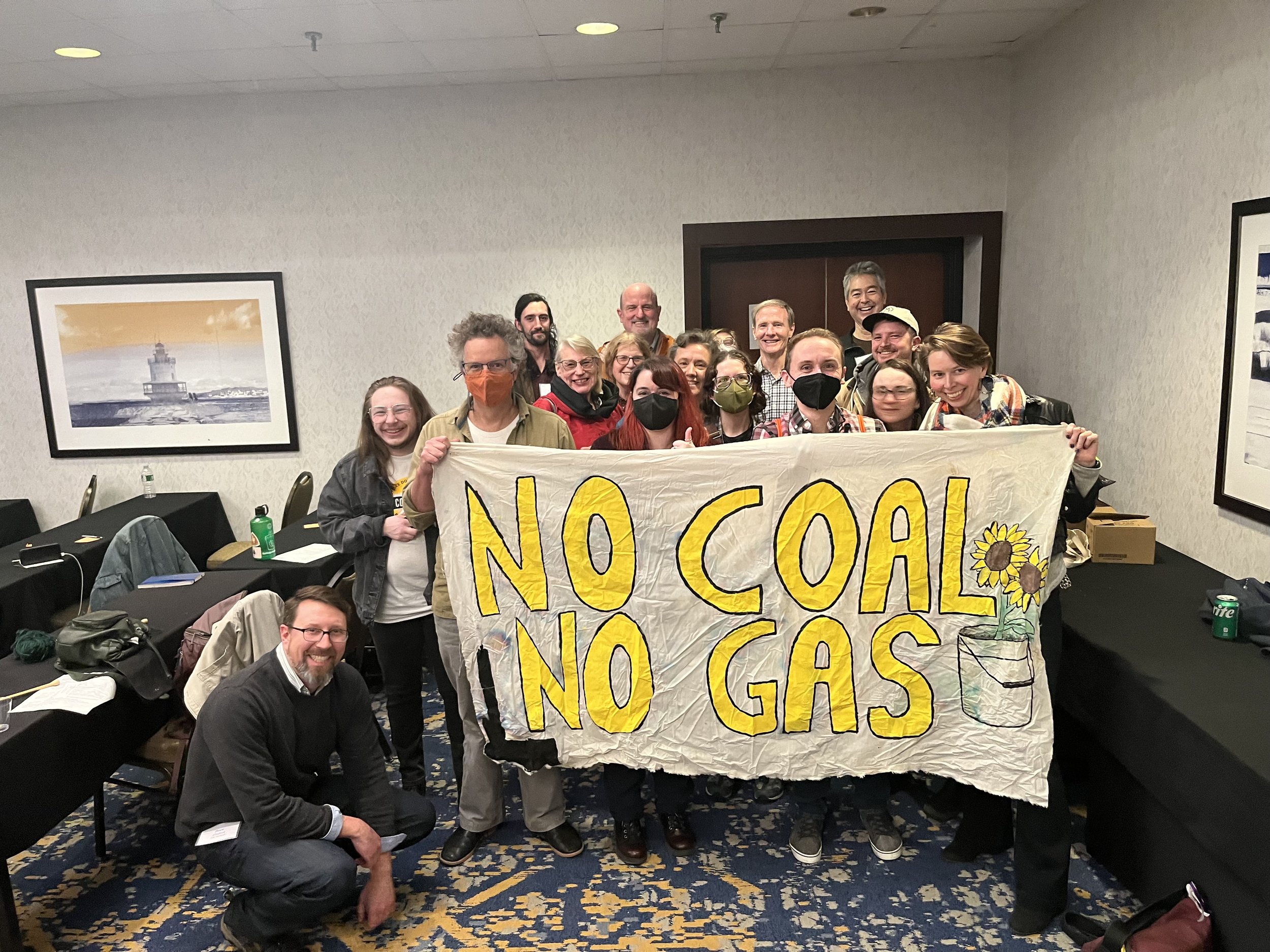Granite Shore Power Confirms Shutdown Date, Hints at Transition Plan
BOW, NH - After a five-year campaign to close New England’s last coal plant, activists have achieved a “firm closure date for coal-fired operations” at Merrimack Station in Bow, NH. This victory comes on the heels of waves of grassroots organizing, a sustained campaign of direct action, and years of environmental protection litigation. By 2028, the entire New England electric grid will be free of coal-fired power plants.
Granite Shore Power released a statement describing their future plans for Merrimack Station. Included was a commitment not to burn coal at Schiller Station after 2025, although the coal-burning units at Schiller have not operated since May of 2020. While GSP describes the transition as a “voluntary closure” resulting from “a historic agreement with the U.S. Environmental Protection Agency (EPA),” activists tell a deeper story — pointing to the work of hundreds of local community members as a primary force responsible for pushing GSP toward a cleaner future.
No Coal No Gas, a campaign launched by the Climate Disobedience Center and 350 New Hampshire, has taken direct action and built public pressure to shut down Merrimack Station while allies at the Sierra Club and Conservation Law Foundation waged many of the legal and regulatory battles associated with this facility. Many more grassroots and public interest groups have been pushing to transition the region to renewables, a move that drives prices down until legacy fossil fuel generators, like Merrimack Station, are unable to compete. These combined efforts put a spotlight on the costly and toxic impacts of this power plant and forced Granite Shore Power to make a plan that brings clean energy to a community that has been burdened by coal for far too long. “When we are fighting the fossil fuel industry, we win by working from every angle,” said Reverend Kendra Ford, Organizer with 350NH and No Coal No Gas. “We build grassroots power, people apply pressure through the legal and regulatory systems, journalists ask questions and follow up, local citizens get engaged in creating the future of their own communities. It takes all of us. I am grateful for everyone’s commitment and persistence.”
GSP now plans to turn Merrimack Station and Schiller Station into “renewable energy parks” featuring solar arrays and battery storage. The messaging closely mirrors previous activist proposals, which is a distinct change in GSP’s messaging. “We demanded Granite Shore Power stop polluting our communities, and they finally realized they cannot get away with keeping coal on the grid,” said Emma Shapiro-Weiss, Co-Director of 350NH Action. “The only viable path forward for them has to be clean, renewable energy. Granite Shore Power may claim this is a voluntary move on their part, but we know that they’ve changed their public position on coal after the immense grassroots support for a transition to clean energy.”
Activists are already considering how to ensure that transition will bring about environmental justice, rather than just continued viability for GSP. “The collective vision for a coal-free New England now has an established date, and we are relieved and excited,” said Nastasia Lawton-Sticklor, a Fellow with the Climate Disobedience Center (CDC). “While ending the burning of coal is an important step toward environmental justice, it does not erase the need for repair of the harms that have been caused to the land, water, and people all over New England, but especially in Bow, NH. Our work going forward must include a restorative process of addressing and repairing those ecological and interpersonal harms so we can work toward a just future together.”
Much of this harm is still ongoing. The announced shutdown comes on the tails of protracted legal action against GSP, which exposed the Merrimack Station’s air and water pollution. For over a year, Merrimack Station has also consistently failed mandatory NH Department of Environmental Services emissions tests and has operated out of compliance with its permits. “A 2028 shutdown is a long way off,” said Eleanor Reid, a No Coal No Gas activist from New Hampshire. “In the meantime, GSP continues to burn coal with broken equipment that allows dangerous pollutants into our air and water. Bow deserves better.”
The No Coal No Gas campaign is determined to push for a faster transition from fossil fuels, both in Bow and in the rest of New England. “Today the No Coal No Gas campaign has achieved one of our major goals — a shutdown date for the last coal-fired power plant in New England. But we still have plenty of work to do to expedite a just transition in Bow and ensure that GSP lives up to its clean energy commitments. And there’s even more work to be done to combat climate injustice on a regional scale, especially as the grid operator, ISO-NE, continues to send our ratepayer dollars to fossil fuel peaker plants, preventing the use of those funds to build the future we need,” said Marla Marcum of the CDC.
“We’re not going anywhere,” added Leif Taranta, CDC and No Coal No Gas Organizer. “We will use the power we’ve built in the fight against Merrimack Station to push forward in our work of building community, showing what’s possible, and ending fossil fuels. We know we can’t rely on corporations, politicians, or grid regulators to save us — scrappy groups of organized people are what make these massive societal shifts possible. New England ratepayers may have ended coal on our grid, but that’s just a taste of what we are capable of. We are only just getting started doing what must be done.”
Contacts:
Rebecca Beaulieu, 350NH Action, rebecca@350nh.org, 978-491-7511
Marla Marcum, Climate Disobedience Center, marla@climatedisobedience.org, 781-475-0996








